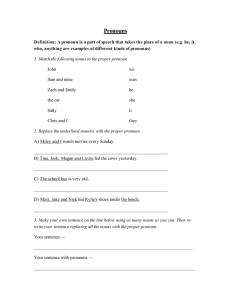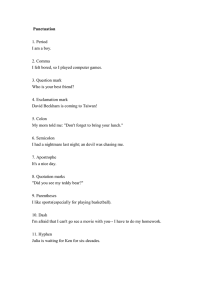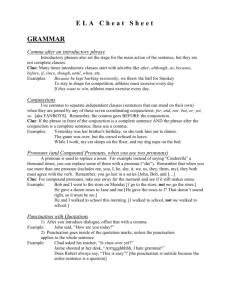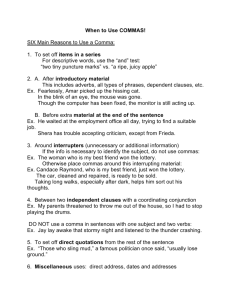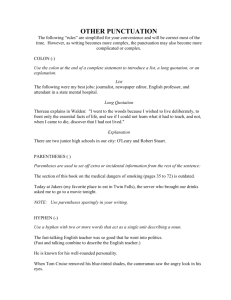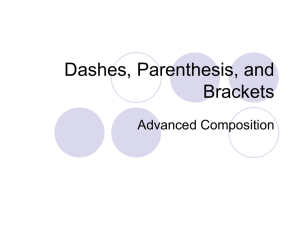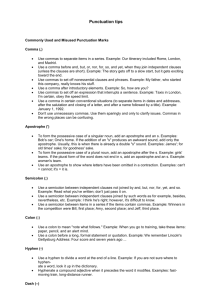Top 10 Mechanical Problems for Journalism, PR and Advertising
advertisement
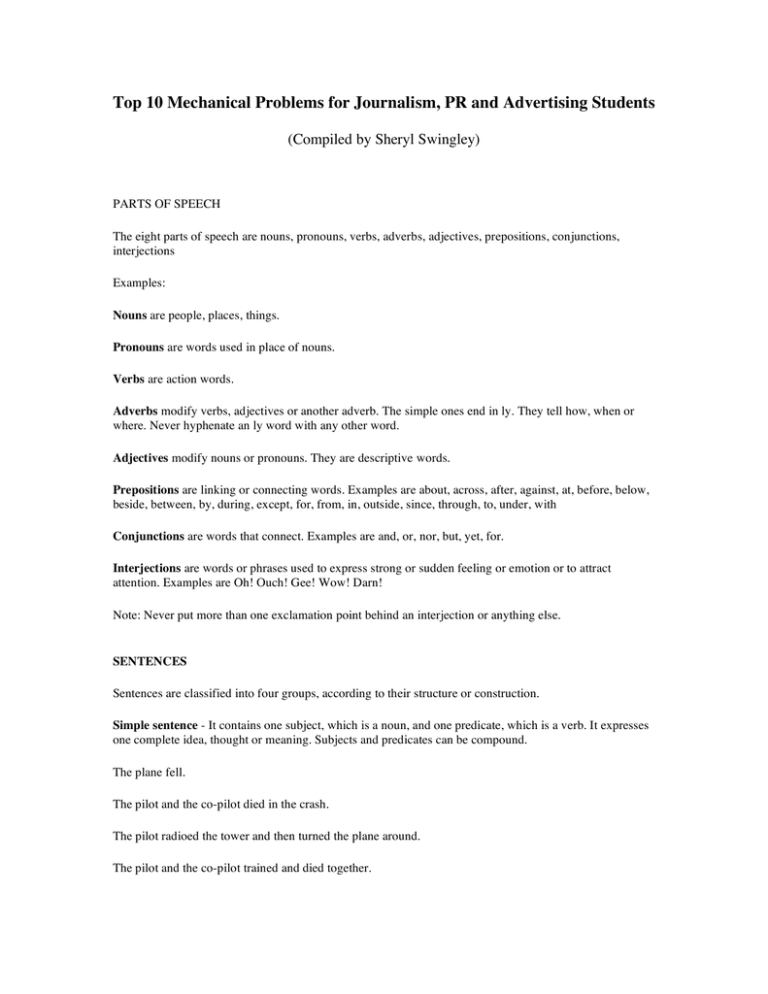
Top 10 Mechanical Problems for Journalism, PR and Advertising Students (Compiled by Sheryl Swingley) PARTS OF SPEECH The eight parts of speech are nouns, pronouns, verbs, adverbs, adjectives, prepositions, conjunctions, interjections Examples: Nouns are people, places, things. Pronouns are words used in place of nouns. Verbs are action words. Adverbs modify verbs, adjectives or another adverb. The simple ones end in ly. They tell how, when or where. Never hyphenate an ly word with any other word. Adjectives modify nouns or pronouns. They are descriptive words. Prepositions are linking or connecting words. Examples are about, across, after, against, at, before, below, beside, between, by, during, except, for, from, in, outside, since, through, to, under, with Conjunctions are words that connect. Examples are and, or, nor, but, yet, for. Interjections are words or phrases used to express strong or sudden feeling or emotion or to attract attention. Examples are Oh! Ouch! Gee! Wow! Darn! Note: Never put more than one exclamation point behind an interjection or anything else. SENTENCES Sentences are classified into four groups, according to their structure or construction. Simple sentence - It contains one subject, which is a noun, and one predicate, which is a verb. It expresses one complete idea, thought or meaning. Subjects and predicates can be compound. The plane fell. The pilot and the co-pilot died in the crash. The pilot radioed the tower and then turned the plane around. The pilot and the co-pilot trained and died together. Compound sentence It consists of two or more connected simple sentences. Each simple sentence that forms part of a compound sentence is an independent clause. (A clause includes a noun and a verb. A phrase doesn't include both a noun and a verb.) Birds twittered in the trees, and rabbits scampered through the brush. Coordinate conjunctions are and, or, nor, but, yet, for. Complex sentence It consists of two or more clauses that are not coordinate or of equal rank. One clause is independent. And one or more clauses are dependent. Hillary Clinton was the first to step from the plane and walk down the steps when the private jet landed in Seattle. When the private jet landed in Seattle, Hillary Clinton was the first to step from the plane and walk down the steps. Compound-complex sentence It consists of two independent clauses and one or more dependent clauses. The cat was on the mat, and the dog was eyeing him when the owner came home. The names of people who are registered will be drawn each week, and several prizes will be awarded. The first sentence has two independent clauses: "the cat was on the mat" and "the dog was eyeing him." The dependent clause is "when the owner came home." This sentence has two independent clauses: "names of people will be drawn each week" and "several prizes will be awarded." The dependent clause is "who are registered." To better understand clauses, read about them in your AP Stylebook under "essential clauses, non-essential clauses." Learn subordinate conjunctions and relative pronouns. 10 Weaknesses of Writing No. 1 The Sentence Fragment This is an incomplete sentence. Sentence fragments are phrases or dependent clauses that cannot stand alone as sentences. It is a group of words that lacks a subject or a predicate. Usually a sentence fragment should be attached to the sentence it precedes or follows. Fragment: The corporation will issue a statement on Monday. Since the commission is meeting then. Rewrite: The corporation will issue a statement on Monday since the commission is meeting then. Fragment: Alvarez is the chaiman of PRSA's National Committee on Graduate Studies in Public Relations. Also the author of the book "What Happens in Public Relations." Rewrite: Alvarez is the chaiman of PRSA's National Committee on Graduate Studies in Public Relations. He also is the author of the book "What Happens in Public Relations." In writing for the electronic media and for ads, sentence fragments might have a place when done knowingly and with purpose. No. 2 Parallel Structure Parallel structure is important for coherence in your writing. It is the principle of placing together ideas that are alike and using grammatical forms or sentence structures that are alike. In a series, all the items should be alike, whether they are all nouns, adjectives, verbs, phrases or clauses. Unparallel: He admires Kathy for her intelligence, energy and because she is a good leader. (Nouns and clause are not balanced.) Parallel: He admires Kathy for her intelligence, energy and leadership. Unparallel: First, he walked in, then he smiled, then he says, "Hello." (Past and present tense of verbs is mixed.) Parallel: First, he walked in, then he smiled, then he said, "Hello." Unparallel: He enjoyed gathering information and then to write about it. (Gerund and infinitive are not balanced.) Parallel: He enjoyed gathering information and then writing about it. Unparallel: One should be prepared; you never know who might call. (Person of subjects is not balanced.) Parallel: One should be prepared; one never knows who might call. You should be prepared; you never know who might call. When you use a list, make sure the first word of each item uses the same form. In other action, the commission: • Approved Bell Kaufman's request that she be allowed to build a guest house in back of her home. • Rejected the request by Ralph Hodges that a parcel of land he owns on Route 66 be rezoned to allow him to build a dog racing track. No. 3 The Apostrophe What's an apostrophe? Most students just refuse to use them unless it's for a contraction; don't for do not, for example. Well, it's time to get to know the apostrophe. It looks like this '. In general the apostrophe takes the place of missing information. When you form a contraction it replaces missing letters; it's = it is When you want to say the '90s instead of 1990s. When you want to form the possessive of a word and you don't want to use the prepositional phrase that starts with "of the." • • • The carpenter's tool = the tool of the carpenter The Smith family's mailbox = the mailbox of the Smith family The children's table = the table of the children There are 20 subcategories under the apostrophe heading in the Punctuation Section of your AP Stylebook or under "possessives" in the main section of the AP Stylebook. You are encouraged to carefully read one section or the other and refer to it often. The answer is there if you'll just take the time to look it up. No. 4 Commas You use commas, but not with a high level of understanding. In my opinion, to use commas properly, you have to know parts of speech and sentence constructions. You have to be able to recognize phrases and clauses. Can you recognize an essential clause or phrase vs. non-essential clause or phrase? Instructors take it for granted that you know these things. In fact, we expect you to know these things. For a quick fix, consult your AP Stylebook. Look under commas in the punctuation section. Again, if you will take the time to read this section, it will help you a great deal in using commas properly. There are five statements I want to make about the comma. One, the comma always goes inside closing quote marks. The period also always goes inside closing quote marks. Two, a semicolon must be used between items in a series that use commas. Examples: • • • The new officers are James Johnson, president; Raymond Nix, vice president; Melba Myrick, secretary; and Jane Brown, treasurer. Other winners were Bob Bell, Shelbyville, $16,000; Ralph Bolden, Lafayette, $10,000 and 5,000 instant tickets; Evelyn Sparks, Evansville, $10,000; T.C. Crawley, Greenwood, $6,000; and Leo Wolf, Evansville, $5,000. Survivors include a son, John Smith, Chicago; three daughters, Jane Smith, Wichita, Kan., Mary Smith, Denver, and Susan Kingsbury, Boston; and a sister, Martha Warren, Omaha, Neb. Three, don't use a comma to join two complete sentences. Such a mistake is a comma splice. To avoid comma splices, you need to learn to stop in your writing. Learn to use more periods and capital letters. Comma Splice: The Fountain of Youth is not in Florida, it's in Russia. Rewrites: The Fountain of Youth is not in Florida. It's in Russia. The Fountain of Youth is not in Florida; it's in Russia. The Fountain of Youth is not in Florida, but it's in Russia. The Fountain of Youth is not in Florida but in Russia. Four, don't use a comma after the time. Incorrect: The president and CEO of Ketchum Communications Inc. will present the Vernon C. Schranz Lectureship in Public Relations at 8 p.m., Thursday, Nov. 16, in Cardinal Hall of the Student Center. Correct: The president and CEO of Ketchum Communications Inc. will present the Vernon C. Schranz Lectureship in Public Relations at 8 p.m. Thursday, Nov. 16, in Cardinal Hall of the Student Center. Five, you don't need a comma after a "be" verb is, was, were, being, been, am Incorrect: The captain of the team is, her brother. Correct: The captain of the team is her brother. No. 5 The Hyphen and the Dash (option + hyphen key = dash) First, let's talk about what each mark looks like. The hyphen is the short mark; the dash is the long mark. Secondly, let's talk about the function for each of these marks. The hyphen pulls things together; the dash separates information. We have our greatest problems with the hyphen; we have few problems with the dash. Hyphenated adjectives or "compound modifiers" as they are called in the AP Stylebook give us the most trouble. Hyphenated adjectives are two or more words that express a single concept. Here are some examples. a first-quarter touchdown a well-known man a bluish-green dress a full-time job a six-week program a first-come, first-served basis Limited Edition, a student-run public relations and advertising agency a 21-year-old woman Proper nouns are sometimes hyphenated. African-American Suspensive hyphenation needs to be used for the following: He received a 10- to 20-year sentence in prison. The 5- and 6-year-olds attend morning classes. Some words require the hyphen to be spelled correctly. Check the dictionary and how they're used. Hyphens are used in phone numbers, book numbers, odds, ratios, scores, some fractions, vote tabulations and Social Security numbers. It's the hyphen that is used when a word is divided at the end of a line. You DON'T use hyphens with "ly" words or with "very." DASH As for the dash, we don't have a lot of problems with it. The dash is used to denote an abrupt change in thought. We use the dash in place of commas. It is the dash that is used in datelines INDIANAPOLIS . What you need to remember about the dash is that a space should be used on both sides of it unless it starts a paragraph. If the dash starts a paragraph, then you don't need to put a space after the dash. Examples: He will fly to Paris in June - if he gets the raise. Her list for Santa includes the following books: -AP Stylebook -Working With Words -Webster's New World Dictionary INDIANAPOLIS Mayor Stephen Goldsmith announced today ... You can make the dash on your computer by pressing the option key plus the hyphen key. The combination of these two keys will make the dash the long mark. No. 6 Word Usage In order to use the proper word, it helps to know word forms and parts of speech: noun, pronoun, verb, adverb, adjectives, prepositions, conjunctions and interjections. What word you use will depend on how it is used in a sentence. Words that students have trouble with because they seem alike but aren't include: its (possessive pronoun) and it's (contraction) there (adverb), their (pronoun) and they're (contraction) to (preposition), too (adverb), two (adjective) effect (noun), affect (verb) your (possessive pronoun) and you're (contraction) do (verb) and due (adjective) then (adverb, adjective or noun) and than (preposition, conjunction) further (adj. or adv.), farther (adj. or adv.) fewer (adj.), less (adj., adv., prep.) like (adj., adv., prep. v), as (adv., prep.) full time, full-time everyday, every day if, whether because, due to, since the, a who, that, which however, but In a grammar book I'm going to recommend you get, there are 56 pages that make up a chapter called "Muddled Language." In this chapter, the authors provide you with lists of words that are incorrectly used. Even if it's a word you've used for years, look it up, and check the true meaning of the word. You might be surprised to find out how you have misused it. Wordsmith James Kilpatrick makes part of his living by writing a column called "Writer's Art." These columns routinely deal with word usage. A recent one talked about the difference between the words alternate and alternative. Kilpatrick noted that one of his readers was complaining about "alternate routes," "alternate forms of expression," and "alternate plans for distribution." What's wrong? It should be "alternative routes," "alternative forms of expression" and "alternative plans for distribution." No. 7 Spelling Check and double-check your spelling. You can't be too careful with spelling. It is especially important to spell people's names correctly. People never forget if you misspell their name. If you can't spell someone's name correctly, the assumption will be made that you can't get other facts correct, either. And if you can't get the facts straight in journalism, your career is over. Use spell checker on your computer. Some of you refuse to do this. Remember, though, that spell check will not catch incorrectly used words. You still need to read your copy for spelling errors. When you have a question about spelling, check your AP Stylebook. If you can't find the answer in your AP Stylebook, then consult a dictionary, preferably Webster's New World Dictionary, Third College Edition. Ask for this dictionary for Christmas. Make it a permanent part of your personal reference library. No. 8 Capitalization For the most part, you want to capitalize everything. Get a grip on this compulsion. There's a section in your AP Stylebook on capitalization. Just about everything you need to know about capitalization is explained in two and a half columns of type. The main thing that I want to emphasize with you is that you capitalize titles when they appear before a name, and lowercase titles when they appear after the name. Example: Public Relations Director Betty Wingrove ... Betty Wingrove, public relations director, ... Capitalize proper nouns, which are unique indentification for a specific person, place or thing. Capitalize the names of languages: English, French, Spanish, German, Chinese, Korean and so on. Capitalize the names of courses when they appear with a number: Journalism 210, Chemistry 4 and so on. Run spell check. Use a dictionary. Read the entry on "capitalization" in your AP Stylebook. No. 9 Pronoun Agreement Indefinite pronouns give us a lot of trouble in agreement because some are singular, some are plural and some can be singular or plural depending on their use. You'll also find indefinite pronouns in you AP Stylebook. The other major pronoun trouble area is getting the pronoun to agree with its antecedent. An antecedent of a pronoun is the word to which it refers. One of the biggest pronoun problems I see in students' writing is getting the pronoun to agree with collective nouns. Wrong: The team will play their final game of the season at 8 p.m. Wednesday. Right: The team will play its final game of the season at 8 p.m. Wednesday. Overall, pronouns can be really tricky. Keep your grammar book handy. I encourage you to read more about the agreement problems that you run into with pronouns. No. 10 Misplaced Modifiers Modifiers can be a word, a phrase, a clause that limits the meaning of another word or phrase. Misplaced modifiers are the things that will cause your boss to laugh out loud when he or she reads your copy. When your boss gets done laughing, she'll say, "I don't think this is what you meant to say." Misplaced modifiers are bloopers. And there are all kinds of misplaced modifiers. Here are a few. Incorrect: While picking daisies, a mad bull charged the children. Correct: While the children were picking daisies, a mad bull charged them. Incorrect: Colorado wildlife officials are investigating the second death of a bull moose. Correct: Colorado wildlife officials are investigating the death of a second bull moose. Incorrect: Police believe that Morin killed Whalen after sexually assaulting her so she could not identify him. Correct: Police believe Morin sexually assaulted Whalen and then killed her so she could not identify him. Incorrect: Susie Kuzma, a Natick resident who volunteers with the MetroWest Hospice, said her grandmother had recently died when she saw an ad in the newspaper for hospice volunteers. Correct: Susie Kuzma, a Natick resident who volunteers with the MetroWest Hospice, said she saw an ad in the newspaper for hospice volunteers shortly after her grandmother had died. Incorrect: The Exploited Children's Help Organization has recently been given a boost in its efforts to combat child exploitation by the Younger Woman's Club in Louisville. Correct: The Younger Woman's Club in Louisville recently gave the Exploited Children's Help Organization a boost in its efforts to combat child exploitation. Incorrect: A convicted sex abuser was sentenced to life in prison with the possibility of parole on Monday. Correct: A convicted sex abuser was was sentenced Monday to life in prison with the possibility of parole on Monday. Incorrect: The Grief Support and Education Center is sponsoring a series of meetings for people who have experienced the death of a loved one on Wednesdays from 5:30 to 7 p.m. Correct: The Grief Support and Education Center is sponsoring a series of meetings on Wednesdays from 5:30 to 7 p.m. for people who have experienced the death of a loved one. Buy a good grammar book for reference. Work With Words: A Concise Handbook for Media Writers and Editors, Brian S. Brooks and James L. Pinson, St. Martin's Press, ISBN number: 0-312-06662-7.
